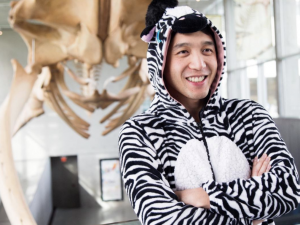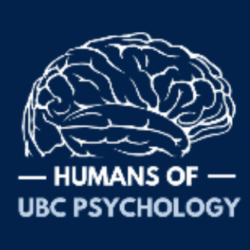
“Someone once asked me, ‘If you could describe your teaching style in one word, what would it be?’ The one word I used was ‘manchild’: the adult man part of me is teaching stuff, but the child part in me is this constant undercurrent that runs through everything I do. How I teach, how I take photos… You say the word ‘research methods’ and people will shiver, roll their eyes, or go OMG WHY; with that kind of material it’s especially important to make sure to add a human element, and I try to do that by making jokes in class. It’s too boring to just be serious all the time…
For me, teaching is secondary to making the classroom human—second to establishing an atmosphere where students feel comfortable. A lot of students coming into university for the first time are shy and don’t know how to connect with each other in such a large-scale anonymous context. UBC is too big. So how do you build community? If you look at the UES (the university experience survey) or UBC confessions, lack of human connection throughout students’ undergraduate careers is a recurring theme… students need to go out and make those connections, but I think it’s also up to other members of the UBC community to help them do that.
That’s why it’s important for me to invite students to Bagels with Ben sessions, to email me, and make it apparent that I’m open, approachable, that I don’t bite, that they can rely on myself and other faculty members as pillars throughout their university journey… I’ll always remember what my social psych prof said to me at the end of term: keep in touch and once her student, always her student. I appreciated that sentiment a lot.
After that course ended, I did find myself keeping her updated with how I have applied what I learned from her in my everyday life. And I find an immense gratification whenever my students do that for me; whenever students come by my office just to chat or email me just to say ‘how’s it going’ …I like to think that my efforts put students at ease, and hopefully that it’ll improve not only their engagement or their academic accomplishments, but their individual wellbeing as well.”
